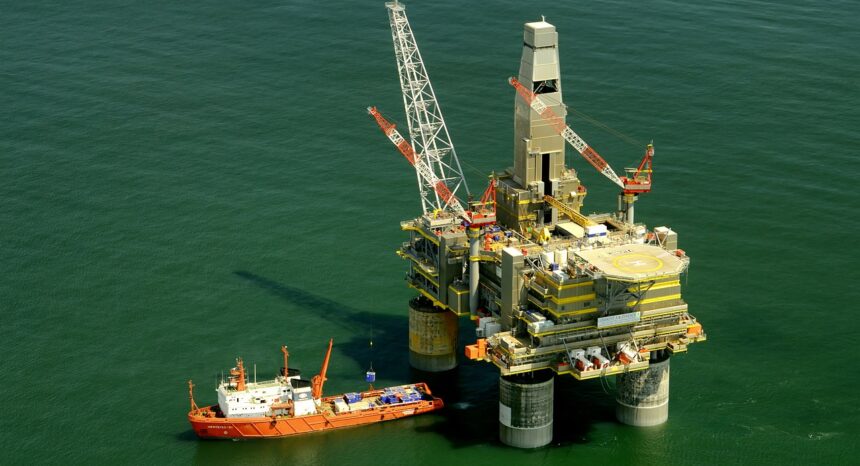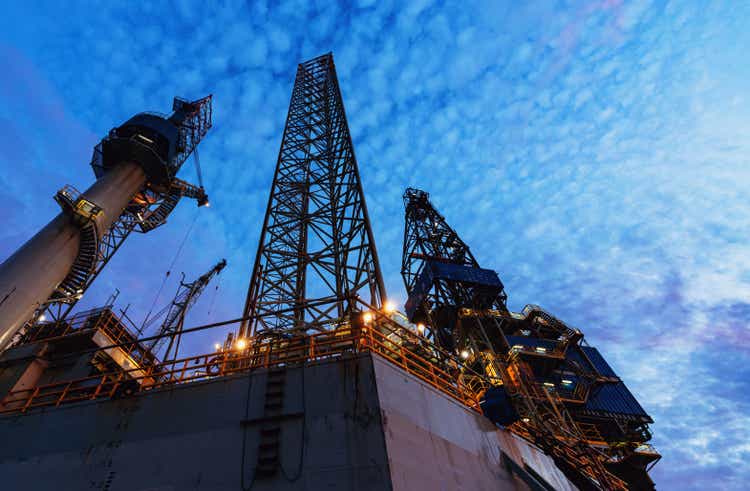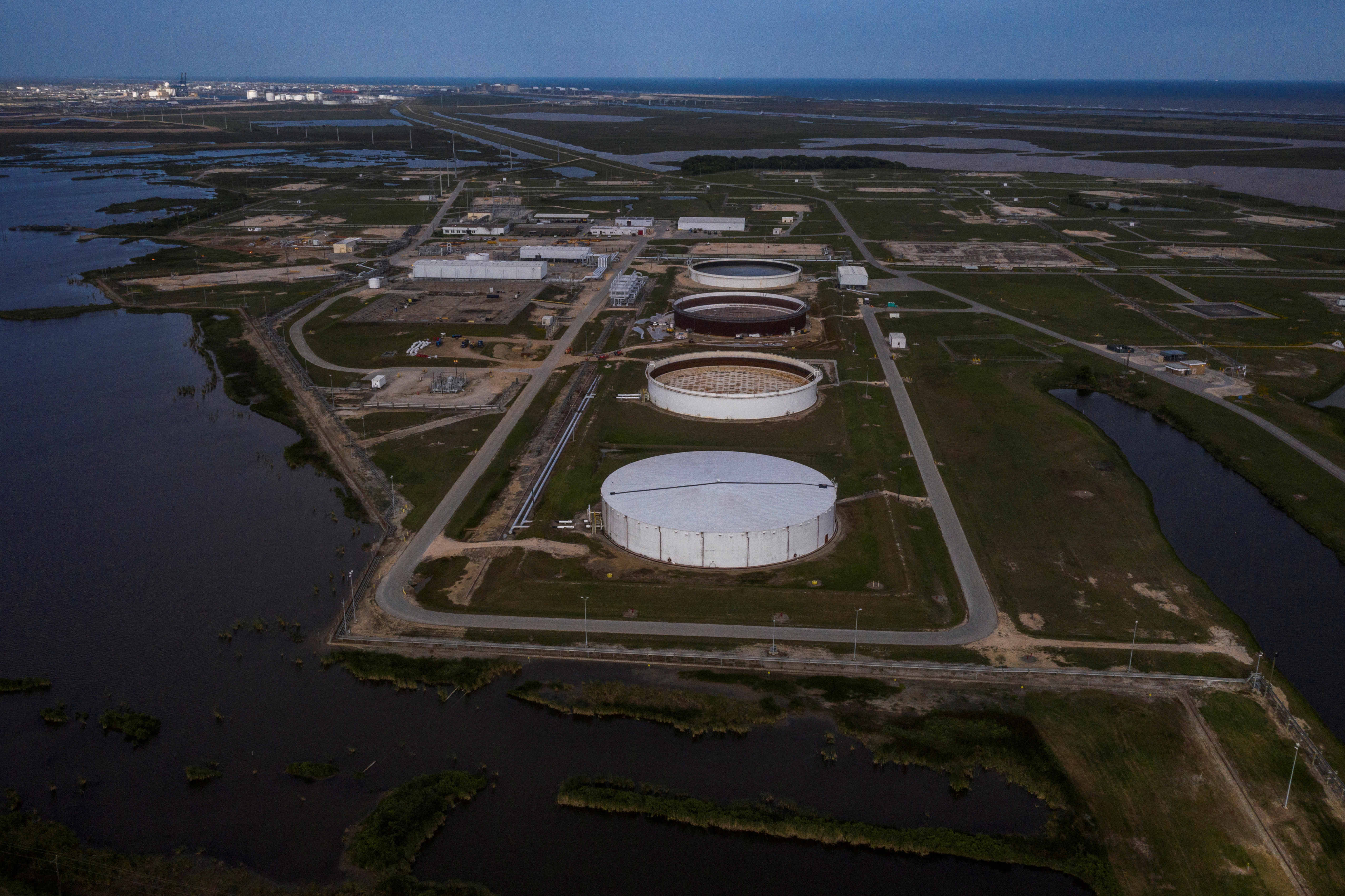- Follow us on Facebook
- Follow us on Twitter
- Criminal Justice
- Environment
- Politics & Government
- Race & Gender
Expert Commentary

Offshore drilling and U.S. public opinion: New research
2016 study published in Energy Policy that examines U.S. public opinions of offshore drilling based on 10 national polls, with a focus on the underlying factors that shape opinions.

Republish this article

This work is licensed under a Creative Commons Attribution-NoDerivatives 4.0 International License .
by Lauren Leatherby, The Journalist's Resource March 7, 2016
This <a target="_blank" href="https://journalistsresource.org/environment/offshore-drilling-oil-public-opinion/">article</a> first appeared on <a target="_blank" href="https://journalistsresource.org">The Journalist's Resource</a> and is republished here under a Creative Commons license.<img src="https://journalistsresource.org/wp-content/uploads/2020/11/cropped-jr-favicon-150x150.png" style="width:1em;height:1em;margin-left:10px;">
The oil market in 2016 looks very different than it did even five years earlier. Oil prices dropped dramatically, and the United States, formerly a large oil importer, is now producing enough oil to be on the cusp of eliminating its net oil imports within the next decade. U.S. domestic crude oil production is up more than 80 percent since 2008. In 2014, the U.S. became the world’s top producer of petroleum and other liquid fuels , outpacing traditional petroleum giants Russia and Saudi Arabia, according to data from the U.S. Energy Information Administration .
As the nation produces more of its own energy, some political and business groups have pressed to open up more areas in coastal waters to offshore drilling. While President Obama approved new oil and gas drilling off the nation’s coastline in 2010, he rescinded that decision after the BP oil spill , the largest marine oil spill in U.S. history . In early 2016, however, the Obama administration is expected to release a proposal that would allow oil and gas drilling in federal waters near Georgia, North Carolina, South Carolina and Virginia. While the governors of those states support the plan, Virginia’s lieutenant governor has voiced concern about how local tourism, commercial fisheries and military training could be affected. Meanwhile, several TV celebrities and dozens of coastal leaders spent a day in January 2016 lobbying against the change .
Two researchers sought to better understand how the U.S. public, as a whole, feels about offshore drilling. Deep Mukherjee and Mohammad Arshad Rahman , economics professors at the Indian Institute of Technology Kanpur, analyzed the responses given during 10 nationwide surveys conducted by two reputable organizations between 2009 and 2012 — before, during and after the BP oil spill. Their April 2016 study, published in Energy Policy , looks at how various factors shape public opinion and influence an individual’s willingness to support or oppose offshore drilling. The study, “ To Drill or Not to Drill? An Econometric Analysis of U.S. Public Opinion, ” also considers how public opinion changes following a disaster such as the BP spill.
Among the study’s key findings:
- Public support declined in the wake of the BP spill, but that reduction in support lasted only 18 months. Once that time period had passed, support for offshore drilling rose and was no longer significantly lower than the level of support had been before the oil spill,
- Factors associated with support for drilling in U.S. waters include a larger household income, being an older age and living in an oil-rich state.
- Those who oppose further offshore drilling are more likely to have a higher education, care more about the environment, and be female.
- Republicans were more likely to support further offshore drilling while Democrats were more likely to oppose it.
Knowing the characteristics of both opponents and supporters of offshore drilling is helpful for policymakers who advocate either position. Studying the demographics of those who support and those who oppose offshore drilling can help policymakers be strategic about how they advocate certain policies regarding the environment and offshore drilling. “From a policy making perspective, it is not only crucial to determine the potential impact of energy related decisions on the economy, it is also necessary to recognize whether implementation of a set of strategies are welcome by the citizens in general,” the authors state.
Related research: In 2015, Journalist’s Resource compiled a collection of studies that analyzed the societal effects of gas prices, including effects on health, driving patterns, economics and policy. A 2013 study published in Energy Policy , “The Effect of the 2010 Gulf Oil Spill on Public Attitudes Toward Offshore Oil Drilling and Wind Development,” explores attitudes related to offshore energy. A 2010 paper from scholars at Brooklyn College and CUNY, “Lessons from the Twin Mega-Crises: The Financial Meltdown and the BP Oil Spill,” looks at how future government policies may help avoid a similar crisis.
Keywords: BP oil spill, Deepwater Horizon, offshore drilling, oil development, fossil fuels, energy, oil extraction
About The Author
Lauren Leatherby
Articles on Offshore oil drilling
Displaying 1 - 20 of 27 articles.

To fight the climate crisis, we need to stop expanding offshore drilling for oil and gas
Daniel Skerritt , University of British Columbia and Claire Huang , Duke University

5 ways Norway leads and Canada lags on climate action
Bruce Campbell , York University, Canada

Equinor has abandoned oil-drilling plans in the Great Australian Bight - so what’s next?
Madeline Taylor , Macquarie University and Tina Soliman Hunter , Macquarie University

Retired oil rigs off the California coast could find new lives as artificial reefs
Ann Scarborough Bull , University of California, Santa Barbara and Milton Love , University of California, Santa Barbara

Drilling for oil in the Great Australian Bight would be disastrous for marine life and the local community
Sarah Duffy , Western Sydney University and Christopher Wright , University of Sydney

Deepwater corals thrive at the bottom of the ocean, but can’t escape human impacts
Sandra Brooke , Florida State University

How weakened US fossil fuel regulations threaten environmental justice in Colorado
Stephanie Malin , Colorado State University

How automation will make oil rigs safer
Sean Loughney , Liverpool John Moores University and Jin Wang , Liverpool John Moores University

The fishy problem of underwater noise pollution
Adam Crane , University of Saskatchewan and Maud Ferrari , University of Saskatchewan

New Hebron offshore oil platform a Canadian engineering marvel
Greg Naterer , Memorial University of Newfoundland

Trump’s push for new offshore drilling is likely to run aground in California
Charles Lester , University of California, Santa Cruz

Trump’s offshore oil drilling plans ignore the lessons of BP Deepwater Horizon
Donald Boesch , University of Maryland Center for Environmental Science

Coastal protection on the edge: The challenge of preserving California’s legacy
Gary Griggs , University of California, Santa Cruz and Charles Lester , University of California, Santa Cruz


Noise from offshore oil and gas surveys can affect whales up to 3km away
Rebecca Dunlop , The University of Queensland and Michael Noad , The University of Queensland

Expertise and innovation: what UK must do to develop its Blue Economy
Richard Andrew Williams , Heriot-Watt University

Trump’s offshore oil drilling push: Five essential reads
Martin LaMonica , The Conversation

Large-scale fracking comes to the Arctic in a new Alaska oil boom
Scott L. Montgomery , University of Washington

Will Obama’s offshore drilling ban be Trumped?
Patrick Parenteau , Vermont Law & Graduate School

‘Deepwater Horizon’ honors oil rig workers but oversimplifies the blowout
Eric van Oort , The University of Texas at Austin

BP in the Bight: why the planned oil spill response is too slow to protect the coast
Andrew Hopkins , Australian National University
Related Topics
- Fossil fuels
- Great Australian Bight
- Gulf of Mexico oil spill
- Marine biology
- Oil and gas
- US energy policy
Top contributors
Director, Ocean and Coastal Policy Center, Marine Science Institute, University of California, Santa Barbara
Emeritus Professor of Sociology, Australian National University
Principal and Vice Chancellor, Heriot-Watt University
Senior Project Manager
Research Associate, Curtin University
Associate Professor of Biology, Penn State
Director, Institute of Marine Sciences and Distinguished Professor of Earth & Planetary Sciences, University of California, Santa Cruz
Assistant Professor of Petroleum and Natural Gas Engineering, Penn State
Professor Emeritus Center for Catastrophic Risk Management, University of California, Berkeley
Director, Centre for Marine Science & Technology, Curtin University
Professor of Law Emeritus, Vermont Law & Graduate School
Senior Lecturer, School of Business, Western Sydney University
Associate Professor of Law, University of Virginia
Lecturer, Jackson School of International Studies, University of Washington
Professor of Organisational Studies, University of Sydney
- X (Twitter)
- Unfollow topic Follow topic
Offshore drilling has dug itself a deeper hole since Deepwater Horizon
Ten years after deepwater horizon, offshore drilling creeps farther away from shore.
By Justine Calma , a senior science reporter covering climate change, clean energy, and environmental justice with more than a decade of experience. She is also the host of Hell or High Water: When Disaster Hits Home, a podcast from Vox Media and Audible Originals.
Share this story
:format(webp)/cdn.vox-cdn.com/uploads/chorus_asset/file/19913768/GettyImages_98606587.jpg)
Ever since the first oil well was built in the Gulf of Mexico in 14 feet of water in 1938, technology advancements made it easier to move farther away from shore in pursuit of new oil reserves, at times without a plan for worst-case scenarios. Just one year before the Deepwater Horizon drilling rig became the site of the most devastating oil spill in American history, it succeeded in drilling what was the deepest oil and gas well ever at the time. The rig bored through more than 35,000 feet of ocean floor while working in waters more than 4,130 feet deep.
Explosions rocked the rig on the evening of April 20th, 2010, after the ultra-deepwater semisubmersible rig Deepwater Horizon had just completed drilling another exploratory well. That night’s events killed 11 people, set loose 200 million gallons of oil that spewed out into the Gulf over the course of nearly three months, and harmed marine ecosystems and coastal economies for years.
Since then, offshore drilling operations continued to creep farther out into ultra-deep waters — where depths reach 1,500 meters (about 5,000 feet) or more. Today’s drilling rigs can work at depths more than twice as deep as Deepwater Horizon. Between 2000 and 2009, just 15 percent of oil production from US waters in the Gulf of Mexico came from ultra-deep operations like Deepwater Horizon. That proportion grew to 52 percent by 2017 , and it likely won’t stop there.
Drilling at new depths unlocks untapped oil reserves
Drilling at new depths unlocks untapped oil reserves and has become easier with newer technologies. But those opportunities come with greater dangers and less margin for error, experts tell The Verge . “The lesson from Deepwater Horizon is [that] at the same time that the technology for extraction was progressing very rapidly — I mean it’s quite amazing actually what they’ve been able to do — the technology for safety lagged,” says Donald Boesch, president emeritus of the University of Maryland’s Center for Environmental Science.
Boesch was appointed by Barack Obama to the national oil spill commission that was put together to investigate the cause of the Deepwater Horizon disaster. He believes the US is marginally better prepared now than it was for the blowout in the Gulf of Mexico in 2010, but there are new scenarios that pose even bigger risks — especially when drilling at extreme depths.
Powerful forces
The Gulf of Mexico produced a record-breaking 2 million barrels of oil a day last year. Sustaining that output will require even more exploration, drilling, and development in deeper waters, Tyler Priest, an oil and energy historian at the University of Iowa, tells The Verge . And the average rate of production for a Gulf of Mexico oil well increases with its depth .
“Nothing generates more free cash flow than a flowing deep water well.”
“Nothing generates more free cash flow than a flowing deep water well,” he says. “You have to keep finding more and more oil as older fields deplete and get plugged and abandoned.”
With higher opportunities for profit come higher stakes. Drilling at deeper depths means working under greater pressure. There’s the crushing weight of the water. And there’s also greater pressure within the oil and gas pockets. Not only are rigs able to work at greater depths, but they’re also able to dig deeper than they ever have. The deeper they dig, the more pressure and resistance they face. The temperature of the trapped oil and gas is hotter the farther down and closer to the Earth’s mantle they dig, too. The equipment needs to be able to withstand temperatures that can reach up to 180 degrees Celsius at about 40,000 feet underground.
“You’re working against some very powerful forces,” Boesch tells The Verge . Gas that’s trapped along with the oil under the seafloor “is going to be wanting to expand very rapidly once the pressure is somewhat relieved [by drilling],” he explains.
The probability of a serious accident, fatality, injury, explosion, or fire being reported grows by 8.5 percent with every additional 100 feet of depth at which an offshore platform operates, an analysis of oil and gas production in the Gulf of Mexico from 1996 to 2010 found. That’s regardless of the platform’s age or quantity of fossil fuels produced.
:format(webp)/cdn.vox-cdn.com/uploads/chorus_asset/file/19913800/GettyImages_99306371.jpg)
The challenges posed by drilling in deeper water can also complicate measures to cope with any problems that occur. “When something does go wrong, like it did [with Deepwater Horizon], it makes it that much harder to control and clean up,” says Sierra Weaver, senior attorney with the nonprofit Southern Environmental Law Center. “We were really conducting experiments in the very deep ocean in terms of how you drill, how you control, and how you clean up oil,” she tells The Verge .
When it comes to how “safe” the Gulf Coast is from a similar event today, “Who knows? You’re really only as safe as you are today,” Priest tells The Verge . “All it takes is some series of misfortunes.”
In Deep Trouble
In the evening April 20th, 2010, a series of misfortunes began to unfold after the crew aboard Deepwater Horizon installed a cement seal to the Macondo exploration well 66 miles off the coast of Louisiana. The seal meant to hold back oil and gas failed and so did two valves that were supposed to prevent the flood of oil and gas from traveling up the pipe to the surface.
The crew then misread pressure tests that should have told them that the well wasn’t properly sealed. They were caught off guard when drilling mud and natural gas began flowing out of the pipe and onto the rig. Once spotted, they tried to close the valves of a “blowout preventer,” a device that should have stopped the uncontrolled release of oil and gas. That failed, too. Within eight minutes of the crew seeing the leak, the natural gas sparked a massive explosion and fires that would eventually bring down the rig.
When it sank, the rig ruptured the pipe that traveled between it and well below, which had been filled with drilling mud to counteract the pressure driving oil and gas upward from the Earth. Without that counter-pressure, oil flowed from the well into the Gulf for 87 days. Several attempts at stopping the leak failed, including trying to fit a containment dome over the well that eventually filled with frozen methane and nearly floated to the surface. Finally, on July 15th, a newly developed device — called a capping stack — was able to seal off the well.
Deepwater Horizon exposed how unprepared the industry was
The failures at Deepwater Horizon exposed how unprepared the industry was to respond to such a catastrophic event. Today, capping stacks are kept onshore, ready to be deployed for another well blowout. They can weigh up to 100 tons and are built to withstand the high pressure coming from a blown-out well. The stack connects to the blowout preventer, adding additional valves that can be closed to slow and stop the flow of oil until the well can be permanently sealed.
“Now we’re prepared for the last war, you know, if the scenario is exactly like before,” says Steven Murawski, lead editor of the 2019 book Scenarios and Responses to Future Deep Oil Spills . “I don’t think we’re going to see another 87-day blowout like Deepwater Horizon,” he tells The Verge .
The Next War
There are other, potentially worse scenarios that Murawski and Boesch worry about, like a pipe fracturing below the seafloor instead of in the water as it did during the Deepwater Horizon crisis. If there were to be a leak below the seafloor, the oil would dissipate into the rock formation surrounding it and escape wherever it can find cracks in the rock. “That would be a doomsday scenario because there’s no way you can shut it off,” says Murawski. You couldn’t simply plop a capping stack over a leaking pipe. The best option currently available would be to dig another well to relieve the pressure within the rock formation and redirect flow. This was done after Deepwater Horizon capsized — but drilling the well takes precious time as the damage of the leak grows with each minute. BP began drilling two relief wells in May, but oil continued to gush from the leak until the capping stack was added in July.
“That would be a doomsday scenario.”
“There was obviously a gap in being able to deploy the resources to shut the well in during that incident,” says Erik Milito president of the National Ocean Industries Association, an industry group for offshore drilling and wind power. Since then, according to Milito, new safety equipment to prevent spills, more capacity to respond to problems, and greater government oversight has led to safer operations.
Others aren’t convinced. “The oil industry has been saying that for as long as they’ve been in existence. Before the Deepwater Horizon happened, that type of accident could never happen. And then after it happened, it was, ‘well this will never happen again.’ And that’s simply not the case,” Weaver says.
She and Boesch point to the Trump administration’s efforts to simultaneously ramp up US fossil fuel production, including a bid to open up more shores to offshore drilling that’s currently tied up in courts, while rolling back environmental protections. After Boesch’s oil spill commission made recommendations to prevent another Deepwater Horizon-like spill, the Obama administration introduced well control rules in 2016 that created new industry standards. Then, in May of last year, the Trump administration weakened those rules ; changing about 20 percent of the original provisions deemed “unnecessary regulatory burdens.”
:format(webp)/cdn.vox-cdn.com/uploads/chorus_asset/file/19913802/GettyImages_101598837.jpg)
The COVID-19 pandemic has implications for offshore drilling, too, as oil prices and demand plummet amid a nearly global shutdown of business as usual. Boesch worries because he’s seen what effect tightened purse strings had on BP’s Deepwater Horizon operation. “They started to cut corners and make hasty decisions,” he says. “That’s my concern about how [the pandemic] plays into safety.” BP was found guilty of “gross negligence” leading to the Deepwater Horizon disaster by a Louisiana federal court in 2014.
“The Deepwater Horizon accident forever changed BP,” the company, which leased the rig, said in a statement. The catastrophe cost BP $65 billion.
Even though offshore drilling is moving further into uncharted territory, 10 years after Deepwater Horizon, its effects still reach the shore. “That oil didn’t know it was supposed to stay offshore, it came right to those communities,” says Weaver. Oil from the spill eventually washed up along 1,300 miles of coastline reaching from Texas to Florida. Tens of thousands of animals perished in the aftermath. And even more people and wildlife were exposed to the lingering toxic effects of the spill. That still wasn’t enough of a wake-up call for oil companies like BP to pull back. A decade later, the risks of deepwater oil exploration continue to loom just over the horizon.
Apple’s ‘I’m a Mac’ guy returns to promote Windows on Arm PCs
Spotify is increasing us prices again, x has new rules that officially allow porn now, pewdiepie ‘avenged’ as mrbeast becomes youtube’s most-subscribed channel, google zero is here — now what.
More from this stream Deepwater Horizon: a decade of disaster
New deepwater horizon data reveals invisible oil that satellites may have missed, this was the decade climate change slapped us in the face, the 2010 deepwater horizon oil spill caused widespread land erosion in louisiana, bp estimates it will pay an additional $2.5 billion for the deepwater horizon debacle.
Baker Hughes, Akastor joint venture HMH submits SEC filing for U.S. IPO

shaunl/E+ via Getty Images
Drilling equipment provider HMH, a 50-50 joint venture between Baker Hughes ( NASDAQ: BKR ) and Norwegian oil services investment company Akastor, said Monday it filed a first draft registration statement with the Securities and Exchange Commission for a proposed IPO , a first step towards a possible U.S. stock listing.
HMH was formed in 2021 with the merger of Baker Hughes' ( BKR ) subsea drilling systems business and Akastor's MHWirth drilling services unit to form a global offshore drilling equipment company.
Akastor said it expects the IPO will begin after the completion of the SEC review process, likely during this year's H2, subject to market conditions; the size and price range for the proposed offering have not yet been determined.
More on Baker Hughes
- Baker Hughes Should Realize Major Tailwinds Throughout The Energy Transition
- Baker Hughes Could Be This Year's Turnaround Play
- Baker Hughes Q1 2024 Earnings Call Transcript
Recommended For You
More trending news, about bkr stock, related stocks, trending analysis, trending news.
- My View My View
- Following Following
- Saved Saved
New Petrobras CEO pushes offshore oil prospect as matter of 'national interest'
- Medium Text

- Company Exxon Mobil Corp Follow
- Company Petroleo Brasileiro SA Petrobras Follow
Sign up here.
Reporting by Fabio Teixeira and Rodrigo Viga Gaier; Editing by David Alire Garcia and Jamie Freed
Our Standards: The Thomson Reuters Trust Principles. New Tab , opens new tab

Business Chevron
Oil hits four-month low as opec+ decision fails to allay demand worries.
The group agreed to extend cuts of 3.66 million barrels per day by a year until the end of 2025. It will also prolong the cuts of 2.2 million barrels per day by three months until the end of September.


IMAGES
VIDEO
COMMENTS
Study with Quizlet and memorize flashcards containing terms like An effective thesis statement should, Read the thesis statement about offshore drilling for oil. Offshore drilling will decrease the United States' dependency on foreign oil. Which evidence would support the author's claim?, What is the goal of a thesis statement? and more.
Study with Quizlet and memorize flashcards containing terms like Read the introduction and first paragraph of an essay about energy sources. (1) The nation's energy use is largely dependent on fossil fuels. ... Read the thesis statement about offshore drilling for oil. Offshore drilling will decrease the United States' dependency on foreign oil.
2 OFFSHORE (OIL AND GAS) AS A DEFINITION Offshore refers to energy activity located at a distance from the shore. Offshore is a broad concept and therefore in this thesis offshore refers to oil and gas drilling only. Wind energy is outside the scope of the thesis. Offshore refers to drilling of oil and gas reservoirs away from the seabed. Oil ...
The article delves into the impact of offshore drilling on marine ecosystems, focusing on environmental concerns arising from pollutants, drilling waste, and oil spills. It highlights threats to marine biodiversity, habitat disruptions, and water pollution. The study aims to deepen our understanding of the complex relationship between offshore drilling and its environmental effects ...
While President Obama approved new oil and gas drilling off the nation's coastline in 2010, he rescinded that decision after the BP oil spill, the largest marine oil spill in U.S. history. In early 2016, however, the Obama administration is expected to release a proposal that would allow oil and gas drilling in federal waters near Georgia ...
Acknowledgement. This thesis is submitted as a partial fulfillment of the requirements for the Master degree of Industrial Asset Management at the University of Stavanger (UIS), Norway. The thesis is carried out on the COSL's first ultra-deep water drilling platform HYSY981 in the period from September, 2009 to March, 2013.
Drilling for Offshore OilOverviewAlthough the first "offshore" oil drilling took place in the mid-1890s, the first true offshore oil rig, out of sight of land, was not built until 1947 off the Louisiana coast. Since that time, offshore and deep-water drilling has become increasingly sophisticated, and oil recovery is taking place in ever-deeper waters on the continental shelf throughout the world.
The Simple Economics of Offshore Drilling by Andrew J. Hoffman and Thomas P. Lyon Professor Tom Lyon Professor Andy Hoffman There is much talk today about offshore oil drilling as a way to lower gas prices and reduce the strains on American consumers. But, much like the gasoline tax holiday proposed in the spring,
Offshore drilling for oil and natural gas is detrimental to the environment, but economically beneficial for the energy industry in the United States. Before the end of his second term in office, former U.S. President Barack Obama issued a ban on offshore drilling. Recently, President Trump declared his intentions to lift the ban and allow energy companies to resume offshore drilling. This ...
Recently, the U.S. Department of the Interior expressed interest in expanding offshore oil production by making available lease areas in the U.S. Gulf of Mexico, the U.S. West Coast and East Coast ...
Combined with the other ocean climate solutions, stopping new offshore drilling would close nearly 40 per cent of the emissions gap needed to meet the Paris Agreement. But without immediate policy ...
Abstract. Offshore drilling in the United States (US) has been the subject of public and political discourse due to multiple reasons which include economic impact, energy security, and environmental hazard. Consequently, several polls have been conducted over time to gauge public attitude towards offshore drilling.
An overall evaluation of offshore drilling fluid technology is performed. The study assesses the relative life-cycle performance of alternatives for density control in drilling fluids (ilmenite versus barite), offshore loading systems (crane-lifts versus a hydraulic system), base drilling fluids (water-base versus oil-base), and waste treatment of
Large-scale fracking comes to the Arctic in a new Alaska oil boom. Scott L. Montgomery, University of Washington. Oil production used to fall when prices were low. But a new drilling boom in ...
Offshore oil and gas operations are growing rapidly with the high demand for energy and oil being the most important source of energy. Many studies indicate that discovery of future oil will be based more in offshore than onshore areas. However, vast offshore facilities and activities create negative environmental and social impacts, as well as
The main work that underlies the concept of offshore drilling is the extraction of natural resources like oil, gas or petroleum from under the water in either the continental shelves or the demarcated water boundaries for each port. Offshore drilling can also be done in lakes, rivers and tributaries. In recent times, most of the offshore ...
Since then, offshore drilling operations continued to creep farther out into ultra-deep waters — where depths reach 1,500 meters (about 5,000 feet) or more. Today's drilling rigs can work at ...
proportion of offshore oil and gas exploration and development of the total investment, increasing from 38% in 2012 to 53% in 2017. Figure 1.1 Global deepwater oil and gas exploration and development investment (Douglas Westwood, 2013, Feb) As the global drilling in deep water increasingly grows, the market of drilling contract
A. The US does not have enough oil to meet its demand; thus offshore reserves would have little impact. B. Americans need to decrease their energy consumption and begin exploration of renewable energy sources. C. The environmental impact of offshore drilling comes at too great a cost. D. Offshore reserves could supply the US with energy needs ...
Abstract. oil exploration, whether land-based or offshore drilling, can cause severe environmental degradation and damage. This is why the oil sector has been among the leading industries in the ...
The Problem with Offshore Drilling. We cannot drill our way to energy independence. Energy security can only be achieved by eliminating the stranglehold oil and gas companies have on our elected officials. Oil and gas companies already hold leases to nearly 68 million acres of federal land and waters that are not currently producing oil and gas.
Read the thesis statement about offshore drilling for oil. Offshore drilling will decrease the United States' Get the answers you need, now! ... Read the excerpt from "The Crab That Played with the Sea." He went North, Best Beloved, and he found All-the-Elephant-there-was digging with his tusks and stamping with his feet in the nice new ...
remain closed in the wake of an offshore pipeline rupture that spread oil across sandy beaches and vibrant wetlands.9 We cannot allow private corporations to continue to extract offshore oil and gas and risk the health of our ocean. Simply put, where they drill, they spill. Offshore oil drilling generates chronic pollution.
HMH was formed in 2021 with the merger of Baker Hughes' subsea drilling systems business and Akastor's MHWirth drilling services unit to form a global offshore drilling equipment company.
Petrobras' new chief executive said a basin in Brazil's Equatorial Margin, an environmentally sensitive offshore prospect seen as the country's most promising frontier for oil exploration, was a ...